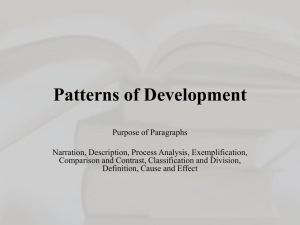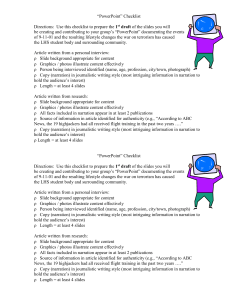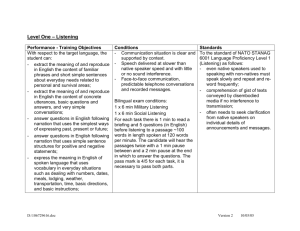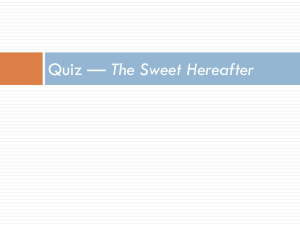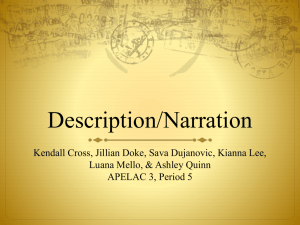short story unit - Oak Park Unified School District
advertisement
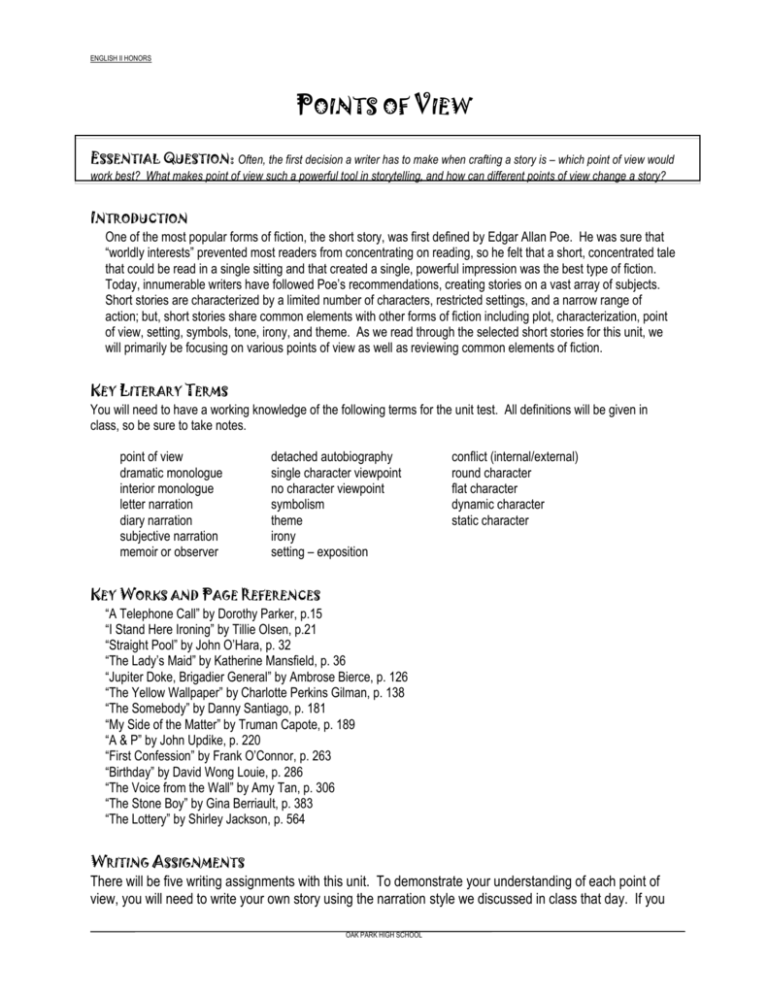
ENGLISH II HONORS POINTS OF VIEW ESSENTIAL QUESTION: Often, the first decision a writer has to make when crafting a story is – which point of view would work best? What makes point of view such a powerful tool in storytelling, and how can different points of view change a story? INTRODUCTION One of the most popular forms of fiction, the short story, was first defined by Edgar Allan Poe. He was sure that “worldly interests” prevented most readers from concentrating on reading, so he felt that a short, concentrated tale that could be read in a single sitting and that created a single, powerful impression was the best type of fiction. Today, innumerable writers have followed Poe’s recommendations, creating stories on a vast array of subjects. Short stories are characterized by a limited number of characters, restricted settings, and a narrow range of action; but, short stories share common elements with other forms of fiction including plot, characterization, point of view, setting, symbols, tone, irony, and theme. As we read through the selected short stories for this unit, we will primarily be focusing on various points of view as well as reviewing common elements of fiction. KEY LITERARY TERMS You will need to have a working knowledge of the following terms for the unit test. All definitions will be given in class, so be sure to take notes. point of view dramatic monologue interior monologue letter narration diary narration subjective narration memoir or observer detached autobiography single character viewpoint no character viewpoint symbolism theme irony setting – exposition conflict (internal/external) round character flat character dynamic character static character KEY WORKS AND PAGE REFERENCES “A Telephone Call” by Dorothy Parker, p.15 “I Stand Here Ironing” by Tillie Olsen, p.21 “Straight Pool” by John O’Hara, p. 32 “The Lady’s Maid” by Katherine Mansfield, p. 36 “Jupiter Doke, Brigadier General” by Ambrose Bierce, p. 126 “The Yellow Wallpaper” by Charlotte Perkins Gilman, p. 138 “The Somebody” by Danny Santiago, p. 181 “My Side of the Matter” by Truman Capote, p. 189 “A & P” by John Updike, p. 220 “First Confession” by Frank O’Connor, p. 263 “Birthday” by David Wong Louie, p. 286 “The Voice from the Wall” by Amy Tan, p. 306 “The Stone Boy” by Gina Berriault, p. 383 “The Lottery” by Shirley Jackson, p. 564 WRITING ASSIGNMENTS There will be five writing assignments with this unit. To demonstrate your understanding of each point of view, you will need to write your own story using the narration style we discussed in class that day. If you OAK PARK HIGH SCHOOL ENGLISH II HONORS are absent on the day of discussion, you can find a description of the narration style in your Points of View book and get the notes from a classmate. You are responsible for completing the assignment for the next class. Each time you are asked to complete a writing assignment, it must follow these guidelines: Write an original story using the assigned point of view. Write no more and no less than one page typed (normal 12 pt. font), double-spaced, ½-1’’ margins. Include an original title, your name and class period. ASSIGNMENT SCHEDULE: DATE P1: 9/12 P 2,6: 9/13 P1: 9/14 P 2, 6: 9/15 P1: 9/16 P 2, 6: 9/19 P1: 9/20 ASSIGNMENTS DATE Turn in summer reading essay assignment Check out POV books Introduce POV unit Take notes on point of view, interior monologue, conflict. HW: Read “A Telephone Call” and “I Stand Here Ironing” and your 1-page typed, original interior monologue is due next class. LATE WORK NOT ACCEPTED! Turn in HW Go over POV Socratic Sem. Assignment Analyze and discuss “A Telephone Call” and “I Stand Here Ironing” Take notes on dramatic monologue, symbolism, theme, tone, setting. Read interior monologues HW: 1) Read “Straight Pool” and “Lady’s Maid” and your 1-page typed, original dramatic monologue is due next class. LATE WORK NOT ACCEPTED! 2) Read your assigned story and create your list of question. Turn in HW Analyze and discuss “Straight Pool” and “Lady’s Maid” Take notes on letter and diary narration Read dramatic monologues, round/flat and dynamic/static characters HW: 1) Read “Jupiter Doke” and “Wallpaper” and your 1-page typed, original diary narration is due next class. LATE WORK NOT ACCEPTED! 2) Continue working on your group presentation. Turn in HW Discuss “Jupiter Doke” and “Wallpaper” P1: 9/22 P 2, 6: 9/23 P1: 9/26 P 2, 6: 9/27 ASSIGNMENTS Turn in HW Groups #1-3 discuss “The Somebody,” “My Side,” and “A & P” Take notes on detached autobiography and memoir or observer narration Read subjective narrations HW: 1) Read “First,” “Birthday” and “The Voice from the Wall” and your 1-page typed, original observer narration is due next class. LATE WORK NOT ACCEPTED! 2) Groups #4-6 Socratic Sem. Assignment due next class. Turn in HW Groups #4-6 discuss “First,” “Birthday” and “The Voice from the Wall” Take notes on anonymous narration and single character point of view Read observer narrations HW: 1) Read “The Stone Boy” and “The Lottery” 2) Groups #7-8 Socratic Sem. Assignment due next class. Groups #7-8 discuss “The Stone Boy” and “The Lottery” Finalize “Point of View” section of i-Notebook Discuss Table of Contents and grading rubric. Review for test HW: 1) Study for test. 2) Finalize POV section of your i-Notebook. Make sure your pages are numbered and your table of contents is complete. P1: 9/28 P 2, 6: 9/30 P1: 10/3 OAK PARK HIGH SCHOOL Turn in i-Notebook after essay Take POV Unit Test ENGLISH II HONORS P 2, 6: 9/21 Notes subjective nar., characterization, irony. Read diary narrations Work on Socratic Seminar Assignment HW: 1) Read “The Somebody,” “My Side” and “A & P” and your 1-page typed, original subjective narration is due next class. LATE WORK NOT ACCEPTED. 2) Groups # 1-3 Socratic Sem. Assignment due next class. HW: Bring your ID to check out English textbook. P 2, 6: 10/4 OAK PARK HIGH SCHOOL

